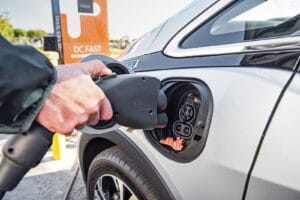
An upcoming boom in EV sales, notably in China, will bring to an end the “oil era,” according to a new study by research firm Carbon Tracker.
While the need for oil won’t end anytime soon, growth in demand will drop by 70%, the study forecast, while the switch to renewable energy could save hundreds of billions of dollars, especially for emerging markets.
“This is a simple choice between growing dependency on what has been expensive oil produced by a foreign cartel, or domestic electricity produced by renewable sources whose prices fall over time,” wrote Kingsmill Bond, the lead author of the Carbon Tracker report.
(EVs cost half as much as gas-powered vehicles for maintenance.)
Two key, ongoing developments anchor the forecast: the emerging market for battery-electric vehicles, or BEVs, and the increased use of renewable energy sources such as wind and solar. Researchers noted that the cost of both technologies has begun falling rapidly. It has been widely forecast that the price of a battery car will reach parity with a comparable gas model within the next five to seven years.

And, with the cost for solar and wind generation also on the decline, Carbon Tracker said that using such sources to power a car will become 10 times less expensive than importing oil to run a vehicle with an internal combustion engine.
The study used what the authors described as a “conservative” scenario laid out by the International Energy Agency. According to the IEA, BEVs will account for 20% of new vehicle sales in India and other emerging markets by 2030, and 40% in China.
The Chinese government recently put in place a new target calling for plug-based vehicles – including both BEVs and PHEVs – to reach 20% of the market by 2025. Longer term, the country’s Ministry of Industry and Information Technology set a target of reaching 50% by 2035. According to the Carbon Tracker report, China could save as much as $80 billion annually by reducing oil imports by 2030. The study did not directly address the additional benefits of reducing China’s endemic smog problems.
(Public EV charging companies switching to more logical pricing plans.)
India, meanwhile, has set a tentative goal of banning the sale of new vehicles using internal combustion engines entirely. All told, emerging markets could save $250 billion annually, the Carbon Tracker study forecast. Currently, oil imports account for 1.5% of China’s GDP and 2.6% of India’s.

Similar strategies are being enacted in a number of developed markets, such as Norway. And the UK last week set 2030 as its date for an IC vehicle ban. The report did not offer estimates of what reduced oil demand in the U.S., Europe or other developed countries might yield in savings.
The shift away from oil to electricity to power tens of millions of vehicles – as well as a growing share of the global energy grid – will have a big impact on the petroleum industry, Carbon Tracker and other researchers indicate.
“Emerging market importers will bring the oil era to an end,” said Carbon Tracker’s Bond.
(Fifteen states join forces to push for an all-electric heavy truck fleet.)
“Factor in the war on plastics hitting petrochemical demand and rising EV penetration in developed markets, it becomes ever more likely that we have seen peak oil demand in 2019,” he added.







